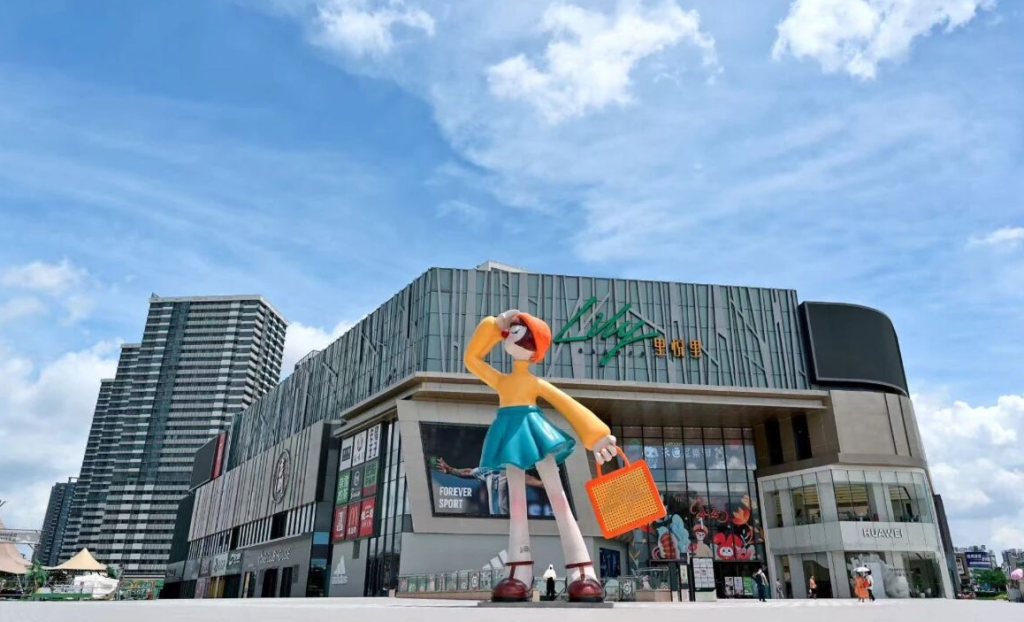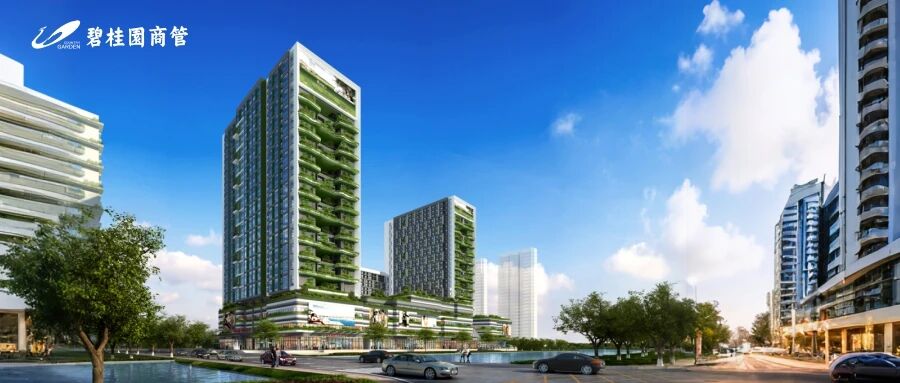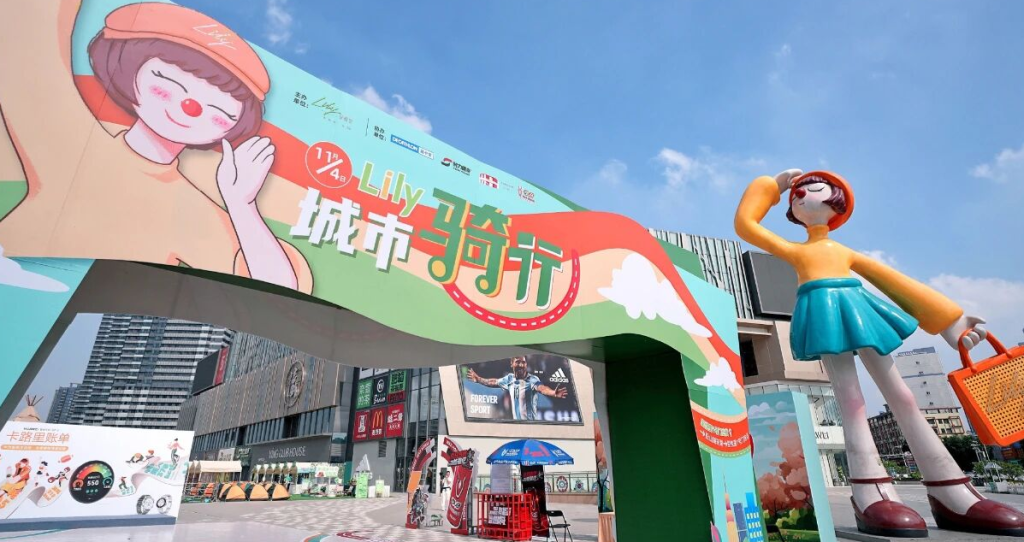Breaking Through the Stock-Driven Era: How Country Garden Commercial Management Group Delivers a New Asset Revitalization Solution Through Innovative Operations
Looking across today’s commercial landscape, a clear consensus has emerged: market leadership is increasingly concentrated, new-build opportunities are nearing saturation, and the industry’s main theme is shifting rapidly toward value-added operations for existing assets.This transformational trend is igniting a fresh wave of urban renewal. From revitalizing old city districts and repurposing industrial heritage to integrating industry with urban life and fostering emerging-area growth, vast amounts of city assets and spaces urgently need to be re-energized.The reshaping of these urban fabrics not only offers new opportunities for business innovation but also forces commercial management enterprises to evolve—from single-point operations to full-cycle asset management.In this new “Big Asset Management” era, the key challenge for commercial operators is how to integrate diverse business chains and use innovative operations to meet the development demands created by city transformation.Urban transformation is far more than a cosmetic facelift; it is a systemic change involving population shifts, industrial restructuring, consumer mindsets, and spatial functions.Commercial real estate is the most sensitive barometer of this change, pointing directly to the direction of growth.Country Garden Commercial Management Group has consistently aligned itself with this macro trend, taking the lead in multi-level market deployment and driving with refined operations.From lower-tier cities to top-tier metropolitan areas, the Group has successfully delivered a number of benchmark projects.Mr. Liu Chenyan, President of Country Garden Commercial Management Group, explains:“Commercial management companies must anticipate urban-transformation trends and use operational innovation to solve the challenges of stock assets.
This is the core logic of our development. Each project follows three key principles: center on local needs, empower with culture, and spotlight innovative experiences. These are critical to driving commercial innovation and achieving sustainable growth.”Industrial Heritage Activation: From “World Factory” to Trendsetting ShowgroundAs urban renewal accelerates and consumer demand patterns evolve, commercial innovation and operational models face higher expectations.In the vibrant Guangdong–Hong Kong–Macao Greater Bay Area, the pace of urban transformation is especially intense.The city of Dongguan, once known as the “World Factory,” is seeking a balance between industrial density and urban livability.With many aging properties and factories exiting the stage, the commercial activation of industrial heritage has created a brand-new growth engine for Dongguan’s retail landscape.One outstanding example of this movement is Dongguan 33 Town, an urban-renewal project under Country Garden Commercial Management Group.Located in the core business district of Dongcheng Street, the site was formerly the Wushigang Industrial Zone—once a manufacturing hub for global brands such as Samsung, Nokia, Sony, and Philips, witnessing the golden era of Dongguan manufacturing.In developing Dongguan 33 Town, Country Garden Commercial Management Group skillfully blended local culture with cutting-edge art and fashion elements, preserving the city’s historical context while transforming it into a vibrant “Urban Trend & Leisure Park” aimed at Gen Z consumers.Today, this rejuvenated mixed-use cultural and commercial district has become a high-profile landmark for culture, commerce, and tourism in the Greater Bay Area.During the renovation, the project deliberately retained key historical features that embody the city’s industrial roots—such as red-brick facades and factory corridors—while reshaping spaces to infuse warm, experiential commercial content.
This precise integration of “memory symbols” into commercial design showcases a masterful approach to turning urban heritage into an emotionally resonant business asset.The original site comprised multiple standalone buildings whose open-floor layouts and barrier-free public spaces set it apart from traditional enclosed malls, carrying an innate “non-standard” commercial DNA.After redevelopment, the project incorporated art installations and graffiti representing the unique cultures of 28 towns and 4 districts across Dongguan, weaving these creative elements into an urban-cultural storyline.Using the city’s neighborhood heritage as a connective thread, the once-scattered factory buildings were linked into a single, cohesive destination featuring seven themed, modular zones.This design sketches a strolling route where motion and stillness coexist, blending the old with the new to create an immersive experience unlike any conventional shopping center.The transformation not only preserved Dongguan’s rich industrial heritage but also fused it with night-market vibes and youth-driven trends, injecting fresh commercial energy and cultivating a distinctive local cultural charm.This collaborative cultural model has allowed institutions such as the South China Art Museum and ZONE-C Art Space to take root, while leveraging Dongguan’s first Gen Z multi-culture label “33-LAB” to host youth-focused events and sustain a vibrant commercial ecosystem.

The result: 33 Town has become one of the most sought-after trend hubs for the city’s younger crowd.Since its debut, the project has earned multiple accolades, including Guangdong Provincial Cultural Industry Demonstration Park, one of the first Provincial New Arts Clusters, the Guangdong Provincial Model Specialty Pedestrian Street, and the Guangdong Provincial Tourism & Leisure District.Expanding Dongguan’s Urban Identity.As China’s nationwide urban-renewal wave deepens in quality and scope, and under the accelerating integration of the Guangdong–Hong Kong–Macao Greater Bay Area, Dongguan’s unique city character is poised for even greater expression.Against this backdrop, Dongguan 33 Town will continue to build momentum in the night-time economy and creative-industry sectors, helping elevate the city’s brand on a regional and national scale.Industry observers at Winshang.com note that 33 Town’s highly localized strategy retains the city’s industrial DNA while meeting local consumers’ appetite for trend-driven self-expression, making it a singular presence not only in Dongguan but across the entire Greater Bay Area.Non-standard commercial projects must adapt to local conditions, focus on urban needs, and enhance customer stickiness—transforming foot traffic into real sales.
The success of 33 Town offers a compelling case study in how to achieve exactly that.Releasing Urban-Experience Demand: Park-Style Malls with High Emotional ValueAs Dongguan’s industrialization and urbanization accelerate, even its once-saturated retail market is generating new opportunities.Consumers increasingly crave relief from concrete surroundings and a relaxed lifestyle, creating a market gap for park-style commercial spaces.Sensing this trend, Country Garden Commercial Management Group proposed an operating philosophy that transforms commercial spaces from mere “functional carriers” into “emotional containers.”Based on deep insights into local consumers’ desire for personal expression, social interaction, and diverse lifestyles, the Group innovatively introduced the concept of a “new-experience, park-style shopping and social center.”Breaking through traditional spatial limits, the design highlights eco-landscapes, interactive social areas, and diverse innovative retail formats, leading to the creation of LiYueLi Shopping Center—Dongguan Dalang’s first park-style family-experience commercial complex.Situated in the core business district of the Songlang area, the project targets the consumption-upgrade demands of high-end talent throughout the Greater Bay Area.Positioned as a “Family Quality-Life Center,” it serves over one million permanent residents, linking surrounding apartments and upscale residential communities to form a multi-dimensional consumer network and become the go-to family-lifestyle destination for the region.In today’s era of “win the consumer, win the market,” commercial spaces that deliver emotional value generate stronger brand loyalty and premium pricing power.
Creating a shopping-enabled social space infused with joy through original commercial IP is a standout example of Country Garden Commercial Management Group’s innovative operations.To achieve this, the Group partnered with a top-tier domestic design firm to craft an exclusive IP character, “LILY,” for Dongguan Dalang LiYueLi Shopping Center.LILY’s themed world—“Lily’s Enchanted Garden”—perfectly aligns with the park-style shopping concept and serves as a spiritual icon throughout the project’s spatial aesthetics, artistic installations, immersive environments, and themed event planning.Coupled with high-frequency, large-scale marketing activations, this strategy has created a phenomenon-level hotspot, firmly embedding the project in consumers’ minds and turning it into a must-visit local landmark.The center’s unique ecological design offers a “healing-place experience,” transforming it from a traditional shopping venue into a mental sanctuary.It provides comfort and relaxation for stressed urban professionals while acting as a “lifestyle glue” for young families.This approach unlocks the value and spending potential of the Songshan Lake area, upgrading Dalang’s retail landscape and setting a new standard for consumer experiences.Industry observers note that local residents—and even visitors from the.

Guangzhou–Shenzhen–Huizhou metropolitan circle seeking a break from high-pressure CBD life—now demand immersive, emotion-driven environments, not just basic shopping functions.The successful operation of LiYueLi’s commercial IP highlights Country Garden Commercial Management Group’s forward-looking innovation and exceptional operational execution.Tapping the County-Level Market: Unlocking a New Blue Ocean.China’s vast county-level economy is emerging as the next growth frontier, encompassing 293 prefecture-level cities, 2,846 counties, and 21,000 towns—a massive “sinking market” fueling regional economic expansion.Industry data underscores the county market’s consumption potential:Starbucks has opened stores in one-third of Chinese counties.Mixue Bingcheng places about 50% of its stores in county towns.KFC now serves more than 2,200 towns nationwide.Demand is booming: Meituan data shows that by 2024, county-level dining orders accounted for 35% of its total and ranked No. 1 among sub-segments; lifestyle-service orders grew 42% year-on-year, while active online merchants surged 49%.The “National County Tourism Research Report 2025” reveals that in 2024, 44 counties achieved over 20 billion RMB in tourism revenue and 63 counties welcomed more than 20 million visitors, with Zhejiang, Sichuan, and Jiangsu leading the top-100 county rankings.
County-level commerce is becoming an increasingly critical part of China’s consumer market.Country Garden Commercial Management Group firmly believes that the county market is not low-end, but a new blue ocean hungry for quality, differentiation, and experiential retail.Commercial strategies for lower-tier cities must go beyond copy-paste models.they need to transfer high-tier experiences downward and tailor finely tuned operations to local habits and cultural-tourism trends to unlock greater economic and social value.Case Study: Suzhou Shengze Phoenix Hub.Building on these insights, the Group launched its first scenario-based commercial complex—Suzhou Shengze Phoenix Hub—precisely targeting the quality-upgrade needs of the local industrial workforce, offering a benchmark for county-level premiumization.Facing challenges such as dispersed spending power, consumer outflow, and limited willingness of high-end brands to enter, Phoenix Hub strategically:Introduced 40% first-to-market brands at opening,Adopted a “one-store, one-plan” approach—pairing each shop with a custom scene to deepen brand-project synergy,Delivered customized services that elevate brand image and refresh consumer experiences,Integrated Shengze’s renowned silk culture to create distinctive retail formats, breaking the cycle of county-level retail homogenization and driving regional consumption upgrades.
Through this innovative and localized strategy, Suzhou Shengze Phoenix Hub exemplifies how precision operations and cultural integration can successfully capture the enormous potential of China’s county-level economy.Verification of Core Capabilities and Future Development Strategy.The project showcases Country Garden Commercial Management Group’s core strengths: using precise market positioning to break through demand bottlenecks, integrating resources to reduce operating costs, and leveraging cultural value to build distinctive competitiveness. It serves as a model for county-level commercial upgrades that deliver first-tier city experiences in lower-tier markets.Deepening Urban Transformation and Sustainable Commercial Development.Urban transformation continues to advance, and the innovative operations of Dongguan 33 Town, Dongguan Dalang Liyueli, and Suzhou Shengze Phoenix Hui are far from isolated cases.The differences in commercial needs seen during various city transitions fundamentally reflect a combination of development stage, resource endowment, policy direction, and market environment.Against the backdrop of national policies shifting urban renewal toward “micro-renovations,” Country Garden Commercial Management Group affirms its commitment to aligning commercial value with social value, deepening government–enterprise cooperation, and focusing on revitalizing and appreciating existing urban assets.The group plans to capture multi-tiered markets through a diverse product portfolio, using commercial space as a carrier to enhance integrated operational services and build a sustainable business growth model that supports high-quality urbanization in China.Expanding Core Economic Circles and Integrated Asset Management.

Deeply rooted in China’s Pearl River Delta and Yangtze River Delta, the group now manages over 3 million square meters of assets across 50+ projects, covering retail complexes, urban renewal, long-term rental apartments, business parks, and office towers.It has successfully built a full life-cycle asset management system encompassing market positioning, design and construction, brand leasing, and operations promotion.According to Liu Chenyan, the company’s housing rental division is now a key strategic focus.“Under the national policy of ‘Housing for All’, the rental housing sector plays a crucial role in the integration of industry, city, and people. It is a vital part of urban renewal, essential to balancing work and residence, and to improving urban economic vitality.Currently, Country Garden Commercial Management Group has integrated premium commercial resources with new business formats, creating a seamless ‘living–consumption–office’ ecosystem.Its long-term rental brand Bihome Apartments already operates in 20+ cities across China.”Diversified Business Matrix to Offset Market Cycles.In an industry characterized by economic ups and downs, combining a diverse business portfolio with end-to-end professional services is an effective strategy to counter market uncertainties.
This approach not only mitigates risk and stabilizes operations but also boosts asset efficiency and strengthens the group’s brand competitiveness, laying a solid foundation for expanding across multiple market tiers.Market Trends and Counter-Cyclical Growth Path.Data from Winshang Big Data reveals that in the past decade, China’s concentrated retail stock has shown a continuous decline in year-on-year growth.In 2024, both the number and scale of newly opened projects hit record lows, while over 90 stock-renovation and reopening projects accounted for more than 20% of annual openings.This highlights the strong demand for professional asset management to revitalize existing properties.Given the enormous opportunities released by ongoing urban transformation—where revitalizing and upgrading stock assets is critical—Country Garden Commercial Management Group’s asset-activation strategy and brand management excellence demonstrate a counter-cyclical growth model, delivering an outstanding answer sheet for sustainable commercial development in China.